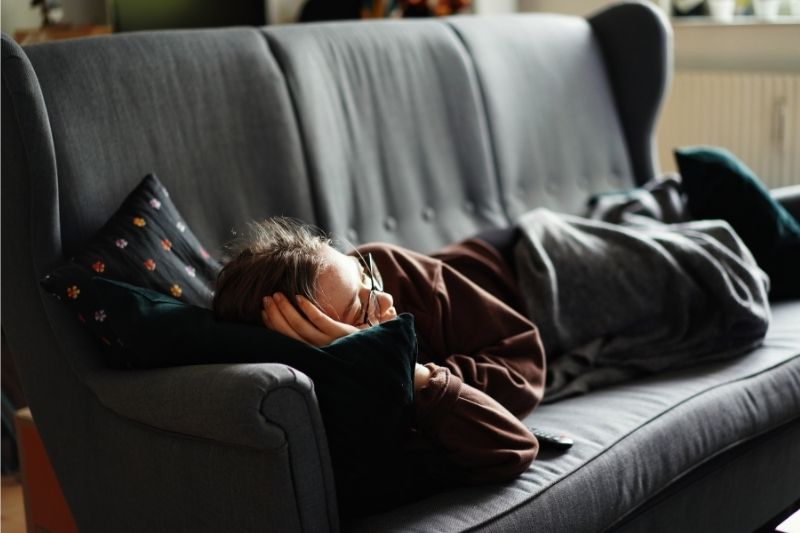No products in the cart.
How to Solve Sleeping Problems And Recover Your Health

Millions of people all over the world suffer from sleeping problems. Insomnia, snoring, sleep apnea, and restless leg syndrome are just a few of the most common conditions that can disrupt your sleep patterns and leave you feeling exhausted during the day. This article will discuss some of the best ways to solve these sleeping problems and get back to feeling your best.
Limit Naps
Although naps can be tempting, it’s best to limit them to no more than 30 minutes during the day. This is because naps can make it harder to fall asleep at night and interfere with your body’s natural sleep-wake cycle. If you feel tired during the day, try taking a brief walk or doing some light stretching instead of taking a nap.
Deal With Snoring
If you or your partner snores, it can disrupt your sleep and make it difficult to get the rest you need. However, there are a few ways you can deal with a snoring problem, such as using Anti-snore pillows, nasal strips, mouth exercises, sleeping on your side, losing weight if you’re overweight, and avoiding alcohol before bedtime. If snoring persists, you should see a doctor for further evaluation.
Establish a Regular Sleep Schedule
One of the best ways to combat sleeping problems is to establish a regular sleep schedule and stick to it as much as possible. This means going to bed at the same time each night and waking up at the same time each morning, even on weekends. Creating this routine will help your body get into a rhythm and make it easier to fall asleep at night.
If you have trouble falling asleep, you can do a few things to help yourself drift off. One is to avoid watching television or working on the computer in the hours leading up to bedtime. Instead, try reading a book or taking a relaxing bath before turning in for the night.
You can also create a sleep environment conducive to relaxation. Ensure your bedroom is dark, quiet, and cool. If you have trouble sleeping in complete darkness, try using an eye mask or earplugs to block excess light or noise.
Exercise regularly
Exercise helps to regulate your body’s natural sleep-wake cycle and can make it easier to fall asleep at night. It also provides several other health benefits, such as reducing stress levels, improving heart health, and boosting energy levels.
If you’re not used to exercising, start by adding simple activities to your daily routine, such as taking a brisk walk around the block or doing light stretching. You can also try more strenuous exercises, such as running or aerobics, but avoid working out too close to bedtime as this can make it harder to fall asleep.
In addition to exercise, many other relaxation techniques can help you sleep better. One is deep breathing exercises, which can help to slow your heart rate and clear your mind before bedtime. Another is progressive muscle relaxation, which involves tensing and relaxing each muscle group in your body from head to toe.
Cut Down on Screen Time
The light from the screens can stimulate your brain and make it difficult to wind down before bed. Try to avoid using electronic devices for at least an hour before bed. Try using dimmed screens and wearing blue-light blocking glasses if you must use them. Another way to cut down on screen time is to limit your exposure to artificial light during the day. Avoid bright lights in the evening and spend time outside in natural sunlight during the day. Natural light helps regulate your body’s sleep-wake cycle and makes it easier to fall asleep at night.
Create a Comfortable Sleeping Environment
Your sleeping environment can also affect your sleep. Make sure your bedroom is dark, quiet, and cool to create an ideal environment for sleep. If you have trouble sleeping in a silent room, try using a white noise machine or earplugs to block out external noise. You may also want to invest in a comfortable mattress and pillows to ensure you’re getting the best possible sleep.
Eat Lighter Meals
Heavy meals can make it difficult to fall asleep and can cause you to wake up feeling uncomfortable. Try eating a light snack or salad for dinner instead of a full meal. You should also avoid eating spicy or acidic foods, which can aggravate heartburn and indigestion. Try drinking warm milk or herbal tea before bed if you’re still feeling hungry.
As you can see, there are a few things you can do to improve your sleep and recover your health. Creating a bedtime routine, avoiding caffeine and alcohol before bedtime, eating lighter meals, and cutting down on screen time can all help you get the rest you need. If you’re still having trouble sleeping, it may signify a more serious condition, and you should see a doctor for further evaluation.










Leave a Reply